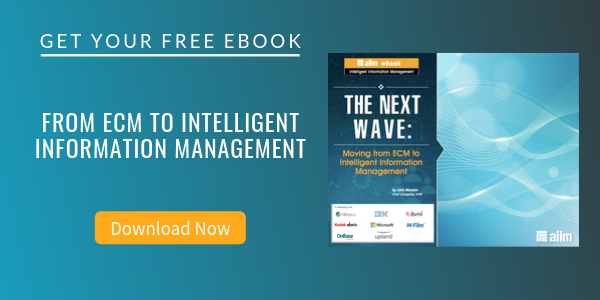
8 Major Trends That Will Change ECM in the Coming Years
Enterprise Content Management (ECM)
Enterprise content management is already composed of a complex, broad set of ideas and technologies - over the next 5 years, a convergence of trends across multiple software categories will have a massive impact on this space. This list is by no means exhaustive, as vendors will also need to deal with evolving challenges around security, retention, workflow, capture, and other aspects of ECM, but the following eight trends will fundamentally change how we build and deploy content management solutions:
The Major Trends That Will Change ECM in the Coming Years
1. Cloud, Cloud, Cloud
We're at the beginning of a shift from on-premise solutions to cloud-based platforms, thanks to the cost efficiencies and shorter deployment times that come with delivering content management over the web. But the cloud is much more than just a new form of delivery; merely moving today's enterprise content management systems to a hosted environment will only achieve incremental benefits.
Vendors now have the opportunity to rethink and reinvent the content management market, leveraging the real-time power of the web and building powerful, elastic platforms that can scale up and down to address the needs of Fortune 500 companies and small businesses alike.
Today, most vendors sell cloud solutions as a separate product line that's missing much of the core functionality of their client-server offerings, but technologies like HTML5 will enable vendors to build richer, more interactive web applications that can better address businesses' massive information and collaboration challenges.
2. Mobile Content
Today's workforce is more mobile than ever before, and content management vendors need to give users access to content across mobile devices to enable collaboration and productivity anytime, anywhere. Workers should be able to view and share files on their iPhones, Blackberries, or Android phones. They should be able to engage more intimately with content on devices like the iPad - commenting on the latest version of a presentation or passing around sales collateral at a meeting. And to truly empower productivity on-the-go, content management vendors should also look to integrate with other mobile productivity applications, so that users can access and engage with content from within mobile applications like QuickOffice or Documents To Go.
3. Redefining "Content"
Database and Platform-as-a-Service solutions are going to drive a whole new definition of what we think of as content. Vendors will need to determine how unstructured and structured content can coexist in this new world. Businesses will produce a tremendous amount of information that needs to be connected to other classes of data in meaningful ways -- for example, invoices need to be managed alongside contracts and customer records in Salesforce. This mixture of data types is going to produce an explosion of interesting apps and platforms to help manage and manipulate this information, and in the process, our definition of "content" will change dramatically.
4. Open Platforms
Content is most valuable when it is accessible across relevant platforms, whether on-premise or web-based. After all, if users are working within Salesforce or NetSuite, shouldn't they be able to access relevant sales collateral without having to open a separate application? Today, integrations with traditional enterprise content management solutions are complex, lengthy, and require significant resources from IT departments or third-party experts. As cloud-based content management becomes more prevalent, we'll see the industry move towards openness, where rich, open APIs enable easy integrations with other systems, and standards like CMIS promote data migration and enable content management solutions to talk to each other.
5. Search Everywhere
In the past decade, Google has unequivocally proven how important search is to our lives. Most of all, our activities involve a search function either at the start of a process or as a foundational element to powering other features and functions. Search will be everywhere, and we'll see services emerge just to help you search your cloud information and enterprise content. Microsoft certainly thought so when it bought FAST. All of Google's products have tightly integrated search. At Box, we try to create as much content workflow through a search context as possible; discovery, navigation, collaboration, and mobility are all enhanced significantly by powerful search capabilities.
6. Collaboration & Globalization
Today's organizations need to be able to do more than store and manage massive amounts of information - they also need to empower end-user collaboration around this content. We're now sharing with colleagues, vendors, and clients throughout the world, and simple and powerful tools that help businesses share are creating a much more connected and productive world. Companies like Jive and Intralinks have demonstrated that there is a serious demand for collaboration technologies in the enterprise, and content management vendors that seamlessly integrate workflow and collaboration tools within their products will enhance the value of that content. Furthermore, cloud-based content management solutions can leverage the power of the web to deliver real-time collaboration features, such as concurrent in-document editing, or real-time discussion threads around files.
7. Social Intelligence
Social is certainly the sexiest trend in enterprise software today. Products across software categories are taking a cue from services like Facebook and Twitter and incorporating more social elements, and content management shouldn't be an exception. Sharepoint 2010 is loaded with social features, Box connects users to relevant people, content, and conversations, and services like Jive and Salesforce Chatter help businesses share information on top of a social architecture. Content management vendors can leverage social recommendations and discovery to surface important business content much more quickly, showcase real-time activities in the news feeds to provide a more holistic view of what's happening in an organization, and aggregate insights into how content is being used.
8. Big Data
With EMC's recent acquisition of Greenplum, the concept of Big Data is starting to get a lot more attention from the larger enterprise software and hardware vendors. A data explosion is inevitable, and we're going to have to start to make sense of all this information that's being created. We're also going to need systems to help manage all of this information, and our current software and hardware architecture likely won't cut it. Finally, culling intelligence from structured and unstructured content is going to provide massive opportunities across industries like Finance, Retail, Healthcare, Science, and more.
About Aaron Levie
Aaron Levie is the CEO and co-founder of Box.net, which he launched in 2005 with the goal of helping people to access, collaborate, and share all their content online. Based in Palo Alto, Box.net has since grown into a leading Cloud Content Management solution for almost 4 million users and companies ranging from small businesses to Fortune 100 companies. At Box, Aaron focuses on product and platform strategy, incorporating the best of traditional content management with the most effective elements of social business software.



